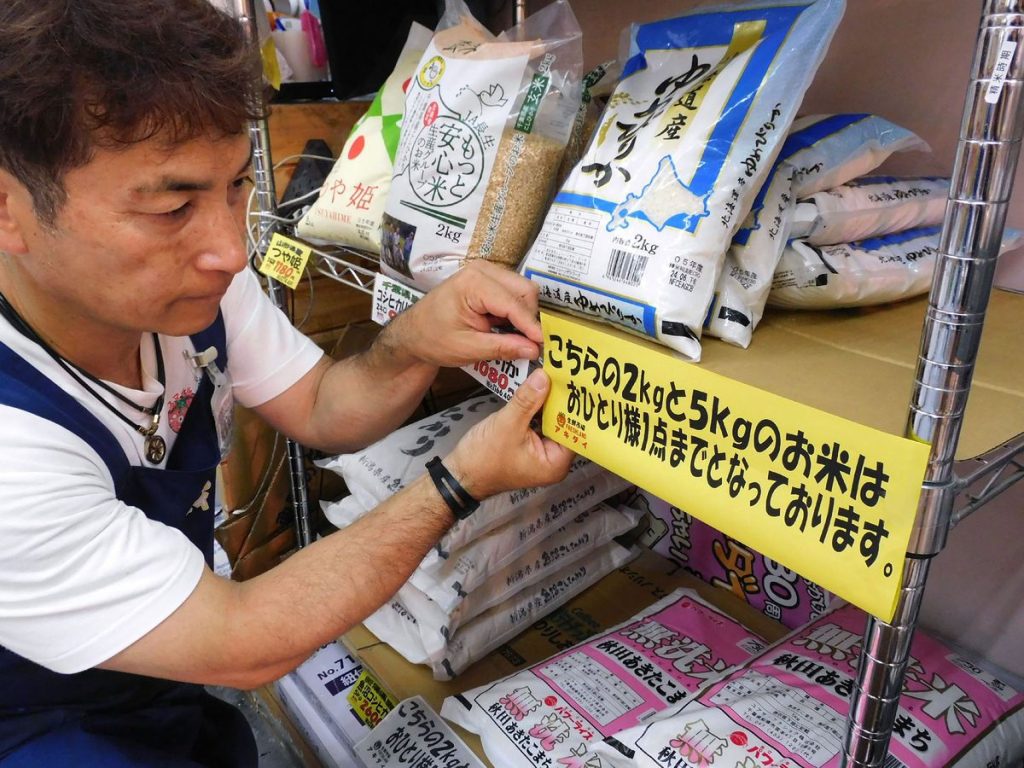Tags
Japan grapples with high rice prices amid shortage
By SHAO XINYING | China Daily Global

Japan has been grappling with soaring rice prices amid a shortage of the staple grain in recent months due to myriad reasons including bad weather and hoarding by households after warnings of impending disasters. Experts have also pointed to the country’s restrictive rice policies as a possible cause.
In the past few months, there have been instances of supermarkets posting out-of-stock notices and purchase limits being put in place as a result of low inventory.
Though bags of new rice have started appearing again on supermarket shelves, residents across the country are complaining about high rice prices.
Rice prices surged 28.3 percent in August compared with the same period last year, the steepest increase in nearly 49 years, the Ministry of Internal Affairs and Communications said last week.
“I noticed the shortage in early August. When I went to the supermarket, the rice had already sold out. The only rice left was foreign brands. We’ve started eating more noodles,” a resident of Chiba Prefecture, who did not wish to be named, told China Daily in early September.
Another resident surnamed Gao from Mito, Ibaraki Prefecture, said: “Rice prices have been gradually increasing. Although Ibaraki Prefecture produces rice, a purchase limit has been in place.”
Topics related to rice purchase limits, price increase and supply shortage have trended on Japanese social media throughout the summer.
Ge Jiyong, executive director of the Institute of Asian Studies at Zhengzhou University, said record-high temperatures have hampered rice production. “Sushi has been impacted as a result. The situation affects ordinary citizens and could impact the country’s overall social development,” he told China Daily.
“Due to the government’s policy of reducing rice cultivation, rice output has been declining over the years,” Xie Ruochu, a lecturer on Japanese studies at the International Department of the University of International Relations, told China Daily.
According to Bloomberg, Japan’s commercial rice stockpiles hit a record low in June. Panic buying, spurred by typhoon and earthquake warnings, worsened the shortage, forcing some retailers to impose sales limits.
“Given Japan’s heavy reliance on imported foods and the yen’s depreciation, turning to alternative staples is also a substantial expense. It will heighten public dissatisfaction and distrust toward the government,” Xie said.
Japan’s last notable rice shortage occurred in 1993, dubbed Rice Riots of the Heisei Era, when a record cold summer led to a fall in supply of Japanese rice, forcing the government to import rice to resolve the crisis, Xie added.
Despite the rice scarcity, Japan’s rice exports hit an all-time high in both volume and value between January and July this year, Jiji Press reported on Sept 4, citing agriculture ministry data. Rice exports climbed 29.1 percent from a year earlier to 6.46 billion yen ($44.4 million) in the reporting period.
“Despite the significant rise in rice exports, the export volume remains limited. This indicates that Japan isn’t currently concerned about its overall rice supply-demand balance,” Xie said.
“Since Japanese rice targets the premium market, maintaining a certain level of exports helps solidify its market position and protects farmers’ interests.”
According to Ge of Zhengzhou University, such contradiction is not “surprising”. “The Japanese government has little choice. With the yen depreciating, exports have naturally risen, especially of rice,” he said.
“By increasing rice exports, the Japanese government earns foreign currency, helping to revive the economy and ensure growth. While some attribute the shortage to Japan’s rigid system, it reveals the government’s capitalist priorities.”
He added that Japan believes in long-term preparation. “While the current situation may lead to an increase in rice prices, Japan does not think it will cause widespread panic across the country and it has to prepare for extreme case scenario.”
Japan’s Minister of Agriculture, Forestry and Fisheries Sakamoto Tetsushi cited the reasons for the shortage such as hoarding in preparation for natural disasters and logistical delays due to holidays at a news conference on Aug 27, Japan’s NTV reported.
However, Sakamoto took a cautious approach regarding the release of stockpiled rice, as requested by Osaka Prefectural Governor Hirofumi Yoshimura. Sakamoto emphasized that such a step should be carefully evaluated, as it could impact the supply, demand and pricing of rice.
Xie of the University of International Relations said the ruling Liberal Democratic Party’s reluctance to release stockpiled rice is tied to elections and the need to maintain support from farmers. “Releasing stockpiled rice before the new rice comes to the market could disrupt circulation and pricing, which will potentially harm farmers’ incomes. With the LDP facing a significant decline in support, the party, which considers farmers a crucial voter base, is unlikely to take actions that might jeopardize their support at such a critical time.”
Jiang Fengguo contributed to this story.
https://global.chinadaily.com.cn/a/202409/27/WS66f6133fa310f1265a1c52d8.htmlPublished Date: September 27, 2024






